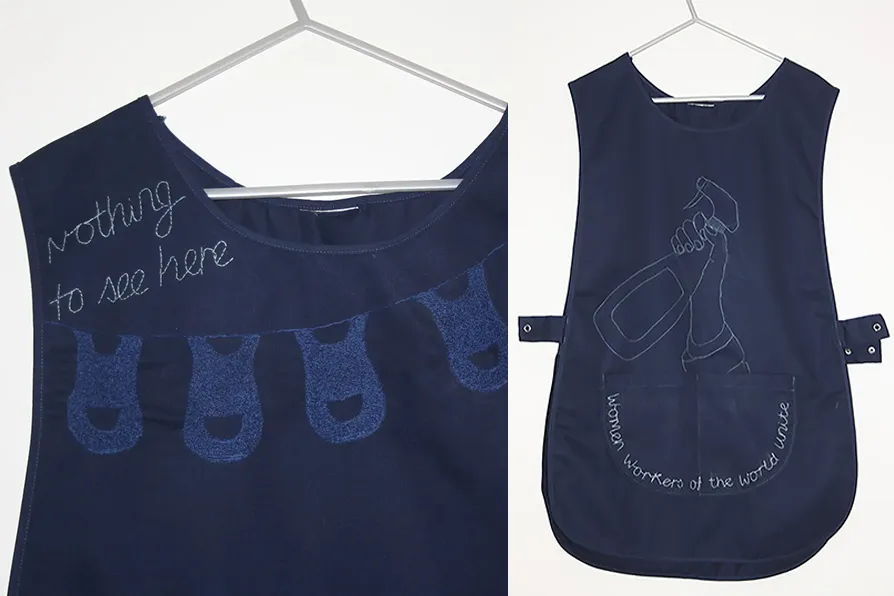JENNY MITCHELL, poetry co-editor for the Morning Star, introduces her priorities, and her first selection
PETER MONAGHAN highly recommends an exhibition of work that highlights the plight of female precarious workers.

 Jill Eastland, Tabard 3 - Nothing to See Here; Tabard 4 - Women Workers of the World Unite [Pic: Courtesy of the artist]
Jill Eastland, Tabard 3 - Nothing to See Here; Tabard 4 - Women Workers of the World Unite [Pic: Courtesy of the artist]
You Never Asked My Name
Cambridge Junction, Cambridge
⭑⭑⭑⭑⭑
IN THE exhibition You Never Asked My Name at the Junction in Cambridge artist/activist Jill Eastland beautifully transforms the dark blue tabards that cleaners, carers, low-paid and precarious workers are habitually made to wear with embroidery and sound recordings that recount the experiences of migrant workers, refugees and asylum-seekers.
These workers form part of the “invisible army” that are frequently marginalised and discriminated against across gender, sexuality, skin colour, religion and disabilities. The uniform contradictorily marks people out as different and thus makes them a target for less favourable treatment, but at the same time renders them invisible.
The different embroidered images on each tabard have been inspired by the stories of these workers and in some cases, have been co-created with them including interviews used as sound pieces to make the stories not only visible but also heard. It’s been important for Jill to make sure that any creators contributing to the exhibition have been paid so that art is not repeating the crimes it is seeking to highlight.
British law and systems often serve to work against migrant workers and other low-paid workers in Britain. Asylum-seekers are disallowed from gaining employment and if their housing provision includes meals, receive as little as £9.95 a week to survive on. Once granted asylum many will be forced into low-paid work despite whatever qualifications they have from their home country if they are not recognised here.
Alongside this, the certificate of sponsorship scheme operated in Britain means that migrant workers rely on often unscrupulous private employers holding their certificate, to remain in Britain legally, giving the sponsor power to coerce the worker into receiving little to no pay, and to threaten them with deportation if they raise concerns.
This is of particular concern in health and social care, where workers report extreme deprivation being forced into what is modern-day slavery, being required to work up to 100 hours a week, living in poor accommodation, subject to bullying, harassment and discrimination.
Through Jill’s and these workers creativity the invisible army has invaded the public space to make themselves seen and heard. This is art as activism.
Runs as part of Platforms Festival 2025 at Cambridge Junction, from October 5-8. For more information see counterpoints.org.uk.










